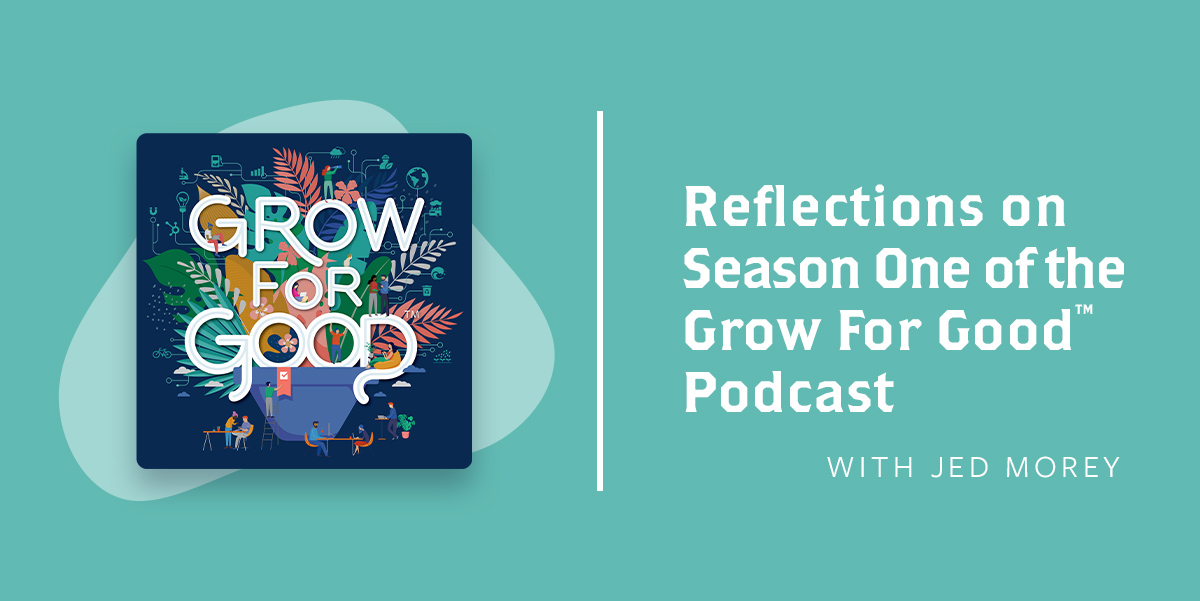As we started kicking around ideas last year for a podcast that would highlight companies doing great things in the world, we landed on a concept that tackles the adage, “doing well by doing good.”
We decided to focus on for profit companies that fit two categories: Firms that are doing good but happen to have a profit motive attached to their respective causes (such as renewable energy or healthcare, for example) and firms with a profit motive that are known more for their community initiatives—think Bombas giving a pair of socks to the homeless for every pair sold, or Ben and Jerry’s and its social justice initiatives.
We decided to name our show Grow For Good™ as it’s our company tagline and has a dual meaning. As a growth-driven digital marketing agency, we help our clients grow their businesses in a sustainable way by implementing best practices around web design, content marketing and lead generation. At the same time, we do our best to align with companies that use their success to do good things in the world. Hence the title, Grow For Good™.
The goal is to create a platform to explore how doing well financially and doing good in the world aren’t mutually exclusive. Like any good experiment, it sounds great in theory but we wanted to test it out in practice. The results do not disappoint.
In just a dozen episodes we have spoken with company founders and executives that are making a positive impact on the world in small and large ways. And some patterns have begun to emerge that I thought would be helpful to share.
5 Takeaways from Interviewing CEOs of “Good” Companies
- Know Your Numbers. Just because you’re mission oriented doesn’t mean you get to ignore the fundamentals. These entrepreneurs are able to speak as fluently about their mission as they are their KPIs. The ones who rely on digital marketing to expand their consumer base are particularly knowledgeable about customer acquisition strategies and conversion rates. Check out the Bombas, American Organic Energy and Fair Harbor episode to hear great examples of this.
- Employees Are “All-In” on the Mission. One of the benefits to running a mission-driven company is securing like-minded talent that believes as strongly as the founders in the purpose behind the mission. Employees who are aligned with your purpose will enthusiastically amplify your message and work diligently toward success. But...
- Be Wary of Groupthink. There’s a flip side to the “all-in” equation. One potential risk of running a Grow for Good™ company is hiring people who look, act and think as the founders do. David Heath of Bombas and Brian Halligan of HubSpot were particularly open about this phenomenon and acknowledged that homogeneous culture can be a detriment long-term. Growing a company the right way requires diversity of thought and experience and is something that must be actively pursued as part of a company’s culture.
- Opportunity is Probably Right in Front of You. The Danehys from Fair Harbor were disturbed by the amount of plastic washing ashore. Laura Kraber thought it was strange the beauty industry employed so many gender fluid individuals but didn’t create products for them. As a legally blind person, Hans Jørgen Wiberg was tired of asking others to assist him with the most basic of tasks. Charles Vigliotti noticed that organic materials were overflowing in landfills and wondered if there was a better way to handle it. Visionaries often notice small things others take for granted and turn them into business opportunities that change our perception of what’s possible. Entrepreneurs follow through on these visions and create a new reality where others are too afraid to go.
- It’s Never Too Late to Be Good. Also, “Good” is a Journey, not a Destination. Susan McPherson of McPherson Strategies is often asked to help companies bring corporate social responsibility initiatives to life. One thing she stressed is that it’s not about when but how and why. There’s no bad time to start doing good but it must have purpose and your employees have to be completely aligned with the concept for it to grow and succeed. As one of only a handful of Black head brewers in the nation, Marcus Baskerville knows that it will take time to build momentum with diversity initiatives in the brewing industry, but he put himself out there to encourage others to follow in his footsteps. Mike LaVecchia is constantly looking for ways to incorporate sustainability into his manufacturing processes and work toward a zero waste future.
Every single person I’ve interviewed sees “goodness” as a spectrum and considers themselves and their companies works in progress. Goodness, like success, is a journey, not a destination.
Stream Season One of Grow For Good™
Don't forget to subscribe, rate and review GFG:

